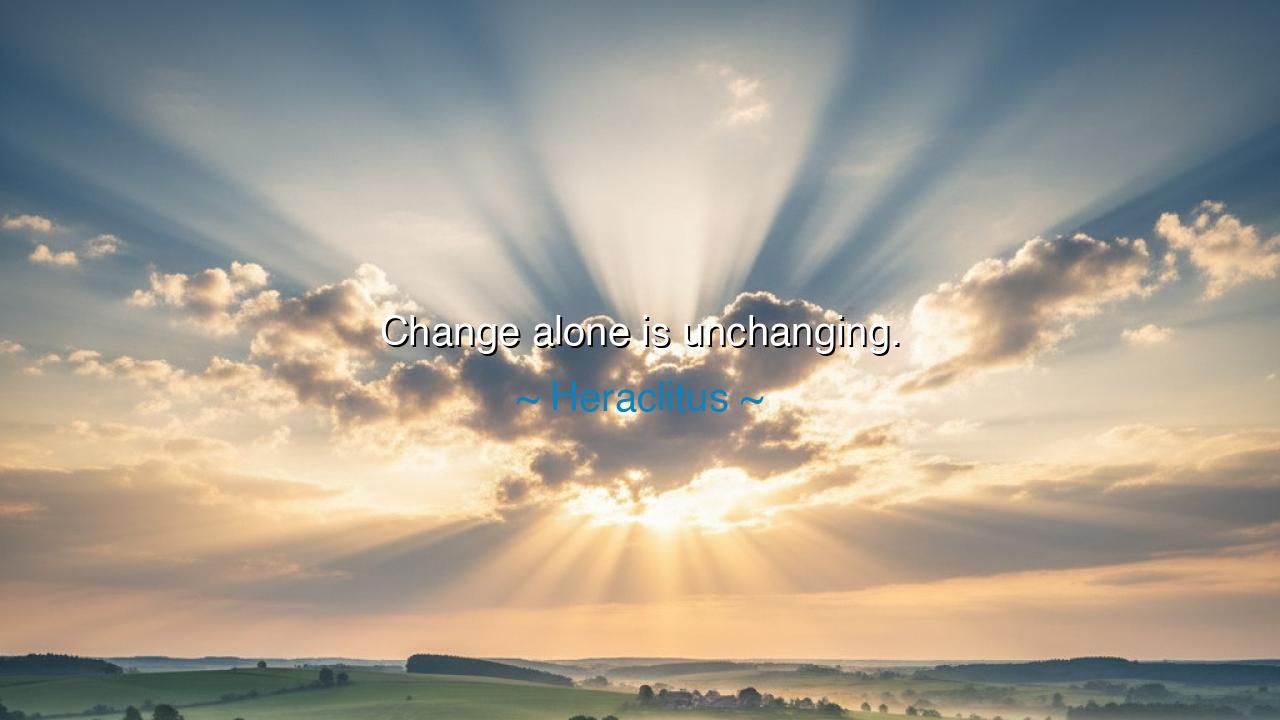
Change alone is unchanging.






"Change alone is unchanging." These words, spoken by the great philosopher Heraclitus, are a profound reflection on the nature of existence itself. In an ever-changing world, where the winds of time sweep over every life and every moment, change remains the only constant. Heraclitus, a man who gazed into the depths of life with eyes unclouded by illusion, understood something fundamental about the human condition: all things, all beings, are in a perpetual state of flux. To him, the river is never the same twice, for even as we step into it, it flows forward, carrying us away. Change, he argues, is the only true and permanent force in the universe.
What Heraclitus meant was not merely that everything changes, for this is an obvious truth that every person, young and old, can attest to. No, he pointed to something deeper, more elusive: that the very nature of existence is built upon this ceaseless motion. It is the ever-changing world that forms the foundation of our reality, and it is this unchanging principle of change that holds all things together. In this light, stability becomes an illusion, a fleeting moment caught between the past and future, but change is the eternal thread weaving through the fabric of the cosmos.
Consider the life of a soldier on the battlefield. His purpose is clear: to defend his land, to protect his people, to fight for honor. But the battlefield itself is a place of constant change. The fortunes of war ebb and flow, and with each strike of the sword, the world shifts. No victory is permanent, nor is defeat. The hero who stands triumphant today may be fallen tomorrow. Change is the silent companion of every warrior. It is what shapes the land, what tests the resolve of kings and commoners alike, teaching them the eternal lesson: that nothing lasts except the force that transforms all things.
In a more peaceful context, let us reflect on the life of the farmer. Seasons come and go, and with each season, his labor changes. In spring, the soil is turned, the seeds are planted. In summer, the crop grows and ripens, bringing the promise of harvest. In autumn, the fruit of his labor is reaped, and in winter, the earth rests, awaiting the return of life. Each cycle is a change, yet it is the cycle of change itself that defines the year. Without change, there would be no life, no growth, no renewal. It is this unfaltering rhythm of change that sustains all things, offering both challenge and reward in equal measure.
Heraclitus understood that our resistance to change, our desire to cling to the familiar and unchanging, is the root of much suffering. The hero who clings to past glories, the lover who longs for days gone by, the ruler who seeks to halt time—all are bound in the chains of illusion. The wise man, however, embraces change as a companion, recognizing it as the force of life itself. To live is to be in a constant state of becoming, always transforming, always learning, always growing. It is only when we surrender to the flow of change that we can find peace, for in accepting the nature of change, we align ourselves with the forces that shape the world.
So, what lesson can we draw from the words of Heraclitus? The world is ever-changing, and it is the unwavering force of change that is constant. The more we resist change, the more we find ourselves in conflict with the very nature of life itself. Let go of the desire for permanence and embrace the beauty of becoming. Understand that each moment is fleeting, yet it is this very impermanence that gives life its richness and depth. Change is not something to be feared; it is something to be embraced. In every change, there is growth, in every loss, there is a new beginning. Seek not to hold on to what was, but to flow with what is, and you will find yourself in harmony with the universe.
In practical terms, this means letting go of old habits that no longer serve you. It means adapting to new circumstances with grace, and learning to thrive in a world that is in constant motion. When faced with difficulty, do not see it as a force that seeks to destroy you, but as an opportunity to transform, to evolve, and to become a stronger version of yourself. Just as the river flows and changes, so too must you. Adapt, learn, and grow—these are the eternal truths passed down by Heraclitus, whispered across the centuries, urging us to live fully in the river of change.






AAdministratorAdministrator
Welcome, honored guests. Please leave a comment, we will respond soon